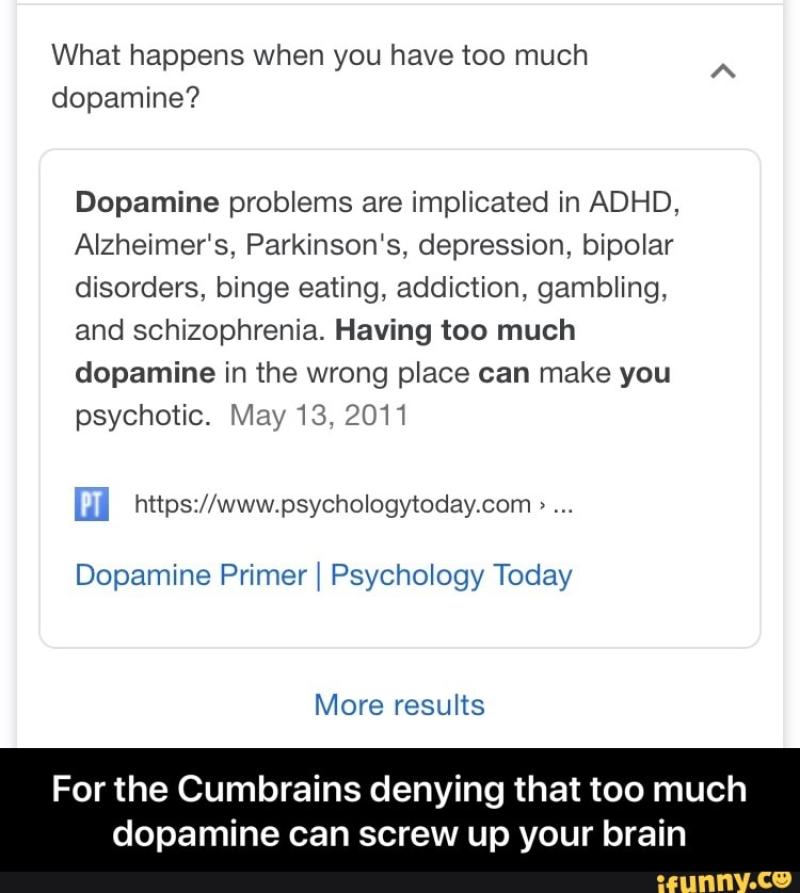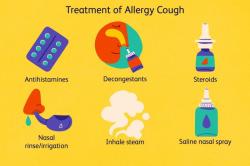What happens if you get too much dopamine?
Dopamine is a neurotransmitter that plays a crucial role in various physiological functions, including mood regulation, movement control, and the brain's reward system. While dopamine is essential for proper functioning, an excess of dopamine or dysregulation of its activity can have various implications for both physical and mental health. Here are some potential effects of excess dopamine:
Psychiatric Disorders:
- Excessive dopamine activity has been implicated in certain psychiatric disorders. For example, schizophrenia is associated with elevated levels of dopamine in certain brain regions. Imbalances in dopamine transmission have also been linked to conditions like bipolar disorder and attention-deficit/hyperactivity disorder (ADHD).
Addiction and Substance Abuse:
- Dopamine is often referred to as the "reward neurotransmitter" because it plays a key role in the brain's reward system. Excessive dopamine release, particularly in response to drugs or addictive behaviors, can contribute to the development of addiction. Substances like drugs, alcohol, and certain foods can lead to an abnormal increase in dopamine levels, reinforcing the desire for repeated use.
Impaired Motor Function:
- In certain neurological conditions, such as Parkinson's disease, there is a deficiency of dopamine in the brain. However, excessive dopamine activity can also result in motor function issues. In some cases, this can lead to hyperkinetic movements or contribute to conditions like tardive dyskinesia, a disorder characterized by involuntary, repetitive movements.
Sleep Disturbances:
- Dopamine has a complex role in regulating sleep. While it is involved in wakefulness and alertness, excessive dopamine activity, especially during nighttime, may contribute to sleep disturbances. Imbalances in dopamine can be associated with conditions like insomnia.
Increased Stress and Anxiety:
- Elevated dopamine levels may contribute to increased stress and anxiety. Dysregulation of the dopamine system has been implicated in anxiety disorders, and excessive dopamine release in certain brain regions can heighten the physiological and psychological responses to stress.
Cognitive Impairment:
- Too much dopamine activity, particularly in the prefrontal cortex, has been associated with cognitive impairments. This can affect executive functions, attention, and working memory. Conditions like schizophrenia, which involve dysregulation of dopamine, may exhibit cognitive deficits.
Psychotic Symptoms:
- Excessive dopamine activity, especially in specific brain circuits, has been linked to the manifestation of psychotic symptoms. In schizophrenia, for example, there is an overactivity of dopamine in certain regions of the brain, contributing to hallucinations and delusions.
Mood Disorders:
- While dopamine is often associated with feelings of pleasure and reward, imbalances in dopamine transmission are implicated in mood disorders. For example, disruptions in dopamine function have been observed in depression, and medications that modulate dopamine activity are sometimes used in the treatment of mood disorders.
It's important to note that the effects of dopamine can be complex, and its role varies depending on the specific brain region and the context of its release. Too much or too little dopamine can have significant implications for mental and physical health, and a balanced dopamine system is essential for overall well-being. If you have concerns about dopamine levels or mental health, it is advisable to consult with a healthcare professional for a comprehensive evaluation and appropriate guidance.
Dopamine overload: What happens if you have too much?
Dopamine is a neurotransmitter in the brain that plays a crucial role in many essential functions, including reward, motivation, movement, and learning. While dopamine is essential for our well-being, having too much dopamine can lead to a range of negative consequences.
Symptoms of Dopamine Overload
Excessive dopamine production or prolonged stimulation of dopamine receptors can manifest in various symptoms, including:
Agitation and Restlessness: An overabundance of dopamine can lead to feelings of restlessness, anxiety, and an inability to relax or focus.
Impulsivity and Reckless Behavior: Elevated dopamine levels can impair impulse control, leading to impulsive decisions, risk-taking, and addiction-prone behaviors.
Sleep Disturbances: Dopamine plays a role in regulating sleep-wake cycles. Excessive dopamine can disrupt sleep patterns, leading to insomnia or excessive daytime sleepiness.
Mood Swings and Irritability: Dopamine imbalances can contribute to emotional instability, mood swings, and increased irritability.
Psychosis: In severe cases, excessive dopamine activity can trigger psychotic symptoms, such as hallucinations and delusions.
Balancing act: The role of dopamine regulation in health
Maintaining a healthy balance of dopamine levels is crucial for overall well-being. Too little dopamine can lead to apathy, lack of motivation, and depression, while too much can cause the negative symptoms mentioned above.
Factors Influencing Dopamine Levels
Various factors can influence dopamine levels in the brain:
Genetics: Individual genetic predispositions can affect dopamine production and receptor sensitivity.
Diet: Certain foods, such as processed meats, sugary drinks, and artificial sweeteners, can temporarily increase dopamine levels.
Activities: Engaging in enjoyable activities, such as exercise, listening to music, and spending time with loved ones, can stimulate dopamine release.
Substances: Stimulant drugs, such as cocaine and amphetamines, artificially elevate dopamine levels.
Chronic Stress: Chronic stress can lead to long-term imbalances in dopamine signaling.
Symptoms of excess dopamine: Recognizing the signs
Being aware of the signs and symptoms of excessive dopamine can help individuals identify potential issues and seek appropriate interventions.
Common Signs of Dopamine Overload
Frequent cravings for stimulating activities or substances
Difficulties with impulse control and decision-making
Restlessness, agitation, and inability to relax
Sleep disturbances and changes in sleep patterns
Mood swings, irritability, and emotional instability
In severe cases, hallucinations or delusions
Lifestyle factors: How diet and activities influence dopamine levels
Diet and lifestyle choices can significantly impact dopamine levels in the brain. Here are some ways to promote healthy dopamine regulation:
Prioritize a balanced diet: Include plenty of fruits, vegetables, whole grains, and lean proteins. Limit processed foods, sugary drinks, and excessive caffeine.
Engage in regular physical activity: Exercise releases dopamine and promotes overall well-being.
Cultivate healthy sleep habits: Aim for 7-8 hours of quality sleep each night. Establish a consistent sleep schedule and create a relaxing bedtime routine.
Practice mindfulness and relaxation techniques: Engage in activities such as meditation, yoga, or deep breathing to reduce stress and promote emotional balance.
Seek professional help if needed: If symptoms of dopamine imbalance persist or worsen, consult a healthcare professional for evaluation and treatment.
Seeking equilibrium: Tips for maintaining a healthy dopamine balance
Maintaining a healthy balance of dopamine levels is essential for overall well-being and mental health. Here are some practical tips to promote dopamine equilibrium:
Engage in activities that bring genuine joy and fulfillment.
Cultivate gratitude and appreciation for the positive aspects of your life.
Build strong and supportive relationships.
Practice self-compassion and avoid self-criticism.
Seek professional help if struggling with excessive dopamine-related behaviors or mental health concerns.













